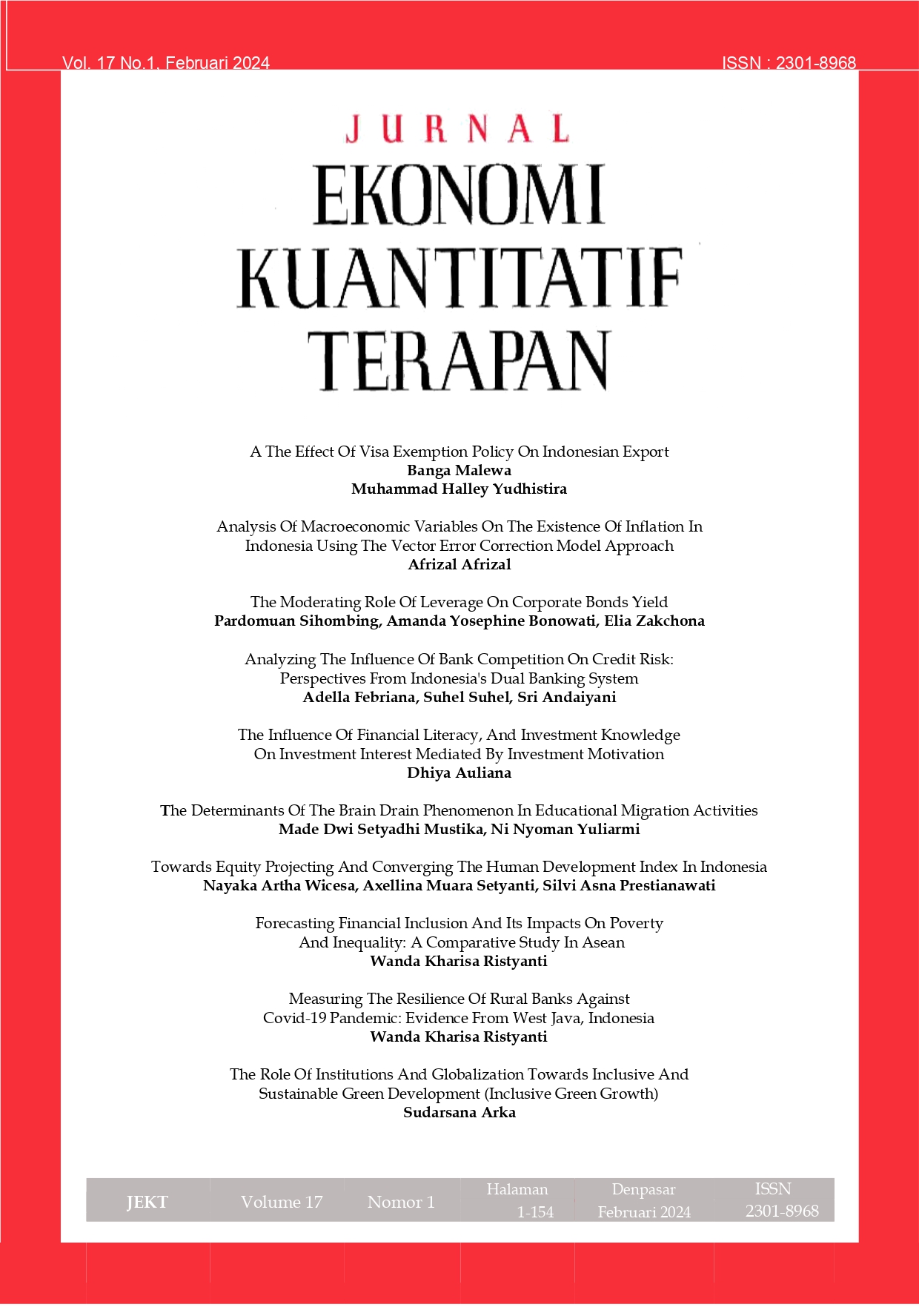THE ROLE OF INSTITUTIONS AND GLOBALIZATION TOWARDS INCLUSIVE AND SUSTAINABLE GREEN DEVELOPMENT (INCLUSIVE GREEN GROWTH)
Abstract
The idea of ??a green economy does not replace sustainable development, but creates a new focus on the economy, investment, capital and infrastructure, jobs and skills as well as positive social and environmental outcomes. The green economy is closely related to SDGs No. 13, climate action, but, even further, this concept directs attention to the quality of life with people at the center. This research tries to see the impact of the development of inclusive green growth in several countries on the welfare of their people. Inclusive green growth prioritizes planetary and human health, and considers them interrelated. Prioritization and implementation of green initiatives also helps countries achieve various sustainable development goals. The hypothesis tested is that countries that implement inclusive green growth in their development policies will have a strong correlation with community welfare, governance of government institutions, and economic openness in the context of international trade. The results of data analysis show that inclusive green growth has a positive and insignificant effect on economic openness in various countries. Government institutional governance has a positive and insignificant effect on economic openness in various countries. Inclusive green growth has a positive and significant effect on the welfare of society in various countries. The governance of government institutions has a negative and insignificant effect on the welfare of society in various countries. Economic openness has a positive and significant effect on the welfare of society in various countries. Inclusive green growth does not have an indirect effect on the welfare of society in various countries. The governance of government institutions does not indirectly influence the welfare of society in various countries.
Downloads
References
Anwar, M. (2022). Green Economy Sebagai Strategi Dalam Menangani Masalah Ekonomi Dan Multilateral . Jurnal Pajak Dan Keuangan Negara (PKN), 4(1S), 343–356. https://doi.org/10.31092/jpkn.v4i1S.1905
Allen, C., & Stuart, C. (2012). A guidebook to the Green Economy Issue 1: Green Economy, Green Growth, and Low-Carbon Development. Division for Sustainable Development, UNDESA.
Azzaki, Muhammad Adnan. (2021). Pengaruh Perdagangan Internasional, dan Keterbukaan Ekonomi Terhadap Indeks Pembangunan Manusia di Negara-negara ASEAN. Jurnal Ekonomi Bisnis dan Kewirausahaan (JEBIK). Vol 10, No 2. Retrieved from https://jurnal.untan.ac.id/index.php/jj/article/view/46953
Bappenas. (2022, 12 21). Retrieved from http://greengrowth.bappenas.go.id/en/faq/
Cappo, D., & Verity, F. ( 2014 ). Social Inclusion and Integrative Practices. Social Inclusion. Vol 2, No 1. Retrieved from https://www.cogitatiopress.com/socialinclusion/article/view/50
https://www.bkpm.go.id.(2022,12 21). Retrieved from https://www.bkpm.go.id/en/publication/detail/news/green-economy-the-main-focus-of-investment-in-indonesia
Haris, Andi Tenri Lawa Putri Lanrang. (2022). Determinan Pembangunan Berkelan Indonesia Dengan Green Economy Sebagai Variabel Moderasi. Disertasi Thesis, Universitas Hasanuddin. Retrieved From Http://Repository.Unhas.Ac.Id/Id/Eprint/22908/
Jha, S., Sandhu, S. C., & Wachirapunyanont, R. (2018). Inclusive Green Growth Index: A New Benchmark For Quality Of Growth. Manila: Asian Development Bank. Retrieved From Https://Dx.Doi.Org/10.22617/Tcs189570-2
Kasztelan, Armand. (2017). Green Growth, Green Economy and Sustainable Development: Terminological and Relational Discourse. Prague Economic Papers. 26. 487-499. 10.18267/j.pep.626. Retrieved from https://www.researchgate.net/publication/317236695_Green_Growth_Green_Economy_and_Sustainable_Development_Terminological_and_Relational_Discourse
Kim, S. E., Kim, H., & Chae, Y. (2014). A New Approach to Measuring Green Growth: Application to the OECD and Korea. Futures. Volume 63, November, Pages 37-48. Retrieved from https://www.sciencedirect.com/science/article/abs/pii/S0016328714001256
Linawati, Yuliasti; Suzantia, Herlina; Wibowo, Muhammad Ghafur. (2021). Dampak Tata Kelola Pemerintahan Terhadap Pertumbuhan Ekonomi dan Indeks Pembangunan Manusia: Studi Kasus Negara Berkembang OKI. Temali: Jurnal Pembangunan Sosial, Volume 3, Nomor 2: pp 133-144. https://dx.doi.org/10.15575/jt.v4i2.12547
Lumbanraja, Penny Chariti Lumbanraja & Pretty Luci Lumbanraja. (2023). Analisis Variabel Ekonomi Hijau (Green Economy Variable) Terhadap Pendapatan Indonesia (Tahun 2011-2020) dengan Metode SEM-PLS. Cendekia Niaga: Journal of Trade Development and Studies. Retrieved from https://jurnal.kemendag.go.id/JCN/article/view/836
OECD. (June 2012). Green Growth and Developing Countries: A Summary for Policy Makers. OECD.
Song, Xuguang Song, Yuanxiang Zhou & Wei Jia. (2019). How do Economic Openness and R&D Investment Affect Green Economic Growth?—Evidence from China. Resources, Conservation and Recycling. Volume 146, July 2019, Pages 405-415. Retrieved from : https://www.sciencedirect.com/science/article/abs/pii/S0921344919301569
UNEP. (2022, 12 21). Retrieved from https://www.unep.org/regions/asia-and-pacific/regional- initiatives/supporting-resource-efficiency/green-economy




















